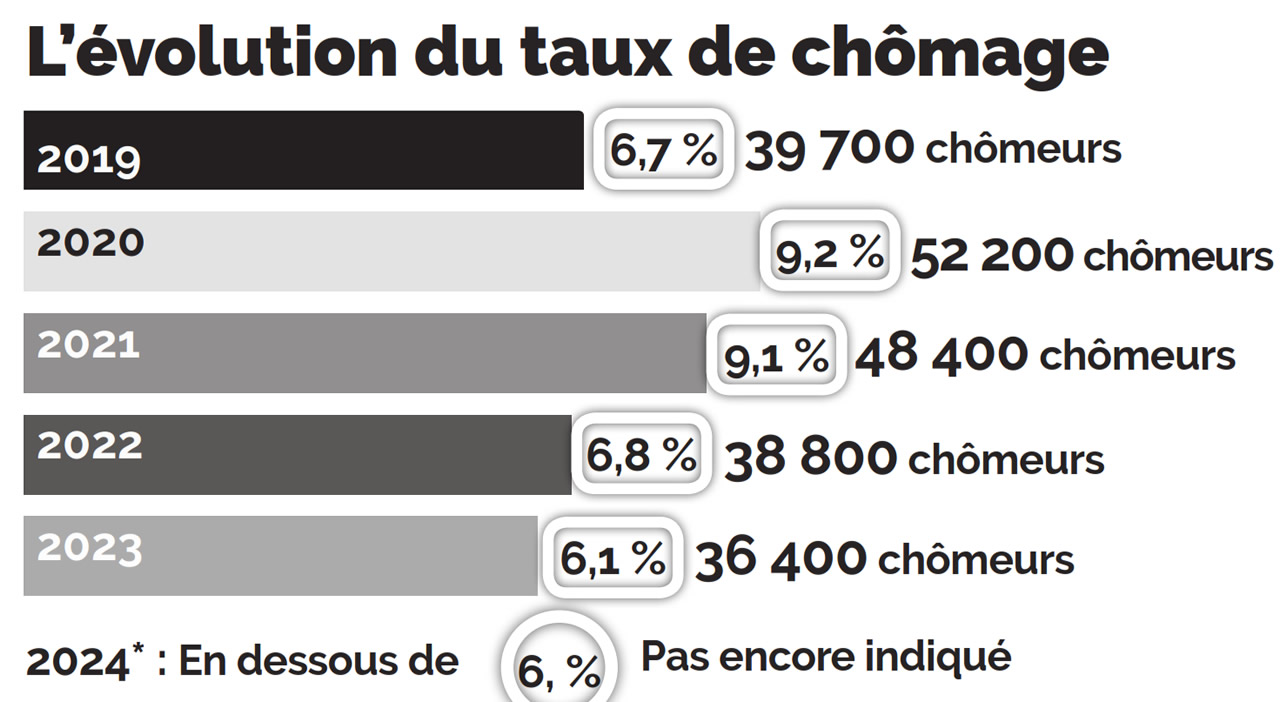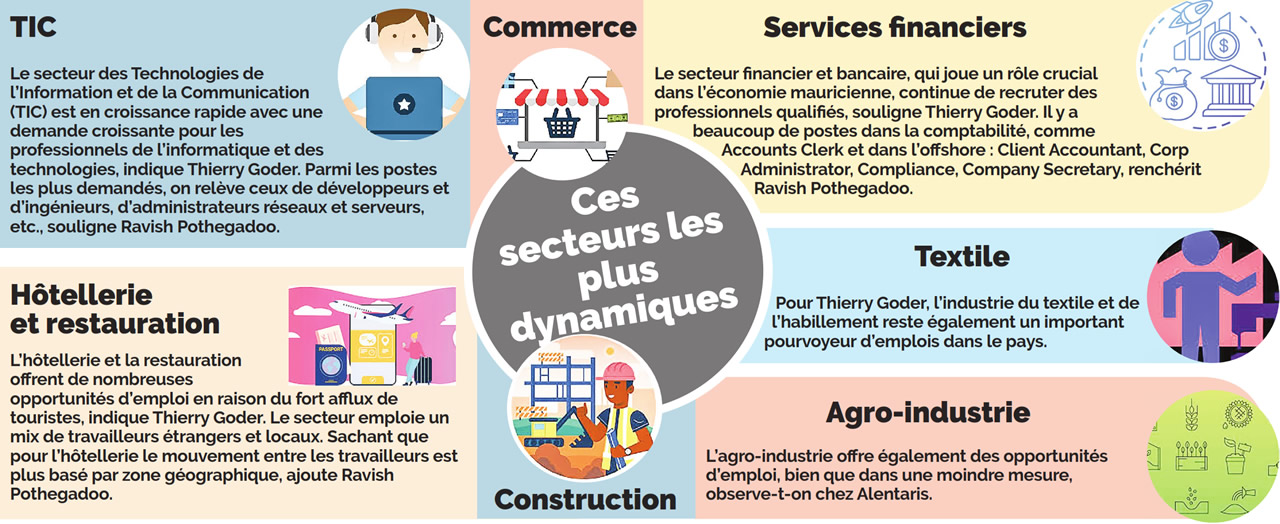The Minister of Finance affirmed this week that the unemployment rate will fall below 6% by 2024. According to recruitment specialists, we are heading towards such a scenario. Because there is great momentum in the economy. Furthermore, they believe that the objective of reaching full employment is achievable if the conditions are met.
Employability and improvement of the economic climate
The unemployment rate will fall below 6% this year. This is what Renganaden Padayachy, the Minister of Finance, told the press this week. Recruitment and human resources specialists believe this forecast is realistic. “It seems to me that we are moving in the direction desired by the Minister of Finance,” explains Thierry Goder, Chief Executive Officer at Alentaris. “The unemployment rate was estimated at 6.1% at the end of 2023. With the expansion of businesses and recruitment in the civil service and construction, the rate may fall slightly below 6% this year,” says, for its leaves, Ravish Pothegadoo, director of Talent on Tap.

Adilla Diouman-Mosafeer, director of Talent Lab, also makes her comment. She explains that the unemployment rate is calculated from the percentage of the population who are actively looking for work, but who cannot find any. “These unemployed people are registered at the Employment Office. If we base ourselves strictly on this definition, the unemployment rate will be less than 6%,” she explains.
Several signs indicate this positive trend. First of all, continues Thierry Goder, an increase in investment in various sectors of the economy could create new job opportunities as well as an increase in recruitment in the public sector. “In addition, the government's efforts to promote entrepreneurship and support small and medium-sized businesses could also contribute to job creation. Furthermore, if stable growth is observed in key industries like tourism, ICT and the financial sector, this could lead to increased demand for labor, which would help keep the unemployment rate at a low level. low level,” indicates Thierry Goder. Finally, he adds, a general improvement in the economic climate and business and consumer confidence indicators could also support this positive employment trend.
These signs which attest to the good dynamics of the job market
…Adilla Diouman-Mosafeer, director of Talent Lab

“There is a certain dynamism in the business world. There are state initiatives in terms of infrastructure projects, but also quite a bit of investment from the private sector. New international companies set up shop in Mauritius almost every week. The business environment is expanding. Investors and businesses are doing their part. They take risks and create jobs. Confidence is there and optimism reigns despite a complicated international situation. This trend is even expected to accelerate, but will we find the adequate human capital to respond to this? This is the question to ask yourself. »
… Thierry Goder, Chief Executive Officer at Alentaris

- Economic diversification: “We have succeeded in diversifying our economy beyond sugar and textiles, by turning to sectors such as tourism, finance, ICT, and the outsourcing of services. This diversification creates new job opportunities in various fields. »
- Foreign investment: “Mauritius has become a hub for foreign investment, attracting international businesses thanks to its favorable regulatory framework, tax incentives and skilled workforce. These investments create direct and indirect jobs. »
- Training and education: “The Mauritian government has placed emphasis on education and vocational training to meet the needs of the labor market. Training programs are put in place to develop the necessary skills in growing sectors, which promotes the employability of Mauritians, although I think we can do better. »
- Infrastructure: “Improving infrastructure, particularly in the areas of transportation and information technology, facilitates business growth and promotes job creation in various sectors. »
- The government strategy: “The Mauritian government is implementing policies aimed at stimulating economic growth and promoting employment, particularly through initiatives to develop small and medium-sized businesses and promote entrepreneurship. »
- The regional hub: “As a regional financial and commercial center, Mauritius is attracting more and more companies wishing to expand their activities in the Indian Ocean region, creating new employment opportunities…all these factors combined contribute to a dynamism in the employment market in Mauritius, offering Mauritians and foreign residents a wide range of professional opportunities. »

Full employment is achievable
Full employment is defined as a situation where the unemployment rate is around 3%. Can we hope to achieve a situation of full employment? For Thierry Goder, the goal of full employment represents a BIG challenge, but it is achievable. “Although the country has traditionally maintained unemployment rates of 6%, reaching as low as 3% will require sustained efforts and targeted policies,” he argues. To hope to achieve a situation of full employment, several elements must be taken into account. Thierry Goder lists them.
Economic diversification
Mauritius relies heavily on certain sectors, such as tourism, textiles and agriculture. Diversifying the economy by developing sectors with higher added value (pharmaceutical sector, artificial intelligence, biotechnology, etc.) can create new job opportunities.
Training and education
Investing in education and skills training is essential to providing workers with the skills needed to meet the changing needs of the labor market, particularly in the areas of technology and innovation.
Encouragement of entrepreneurship
Supporting local entrepreneurs can boost job creation and encourage innovation. Policies favorable to small and medium-sized businesses can be put in place to facilitate private sector growth.
Full employment policies
Government policies such as hiring incentives, job reintegration programs for the long-term unemployed, and measures to reduce barriers to youth employment can help boost employment.
Flexible labor market
It is important to maintain a balance between protecting workers' rights and the flexibility needed to promote job creation. Labor market reforms can be considered to encourage hiring and investment. “In summary, although achieving full employment in Mauritius may require significant efforts and structural reforms, it remains an achievable goal with a strategic vision and policies adapted to the country's specific economic and social challenges” , concludes Thierry Goder.
… Ravish Pothegadoo, director of Talent on Tap
- Positions of power: “There is a lot of recruitment in sectors such as the Civil Service and parastatal bodies, and in the private sector (financial services, ICT, BPO and hospitality). »
- More businesses: “There is an expansion of business in Mauritius, particularly in ICT-BPO and especially the financial sector. »
- More self-employed: “There are more 'self-employed' thanks to social networks. You only have to see the boom in terms of product sales on Facebook, not requiring expenses such as renting an office or a display window for products including for catering and catering and making cakes, etc. We are also seeing a growing number of consultants (people with a lot of experience in a specific sector who no longer wish to be employed by a company). Which suits SMEs who do not have the budget to recruit these people full time. »
- These other reasons: “Given inflation, and the current cost of living, more people per household, including young people, now have to work. Likewise, with the increasing number of divorces, we note that some people – who would not normally be on the job market – have taken up employment, but it is on a very small scale. Note that more than 75% of people leaving the unemployed pool this year are women. »These challenges to take into consideration
These challenges to consider
Thierry Goder:
“In addition to traditional challenges such as unemployment and matching worker skills to market needs, there are other specific challenges. These challenges include the need to adapt worker skills to emerging industries such as technology and digital, as well as creating sustainable jobs amid pressure on the island's natural and environmental resources. Additionally, the pandemic has accentuated economic inequalities and disparities in access to employment, requiring special attention to ensure an inclusive and equitable recovery. »
Adilla Diouman-Mosafeer:
“Mauritians who emerge on the job market do not find the right fit and turn abroad while the country brings in foreigners because the local workforce is not as present as we think. requires. This is paradoxical. You have to change your strategy to establish a balance. This mismatch problem needs to be addressed. The disparities between supply and demand must be resolved. There must also be acceptance of foreign labor in companies. We do not have the choice. We are becoming like Singapore and Dubai. We are forced to bring in labor. This is a short-term solution. But, in the long term, we need to develop a whole strategy. But, above all, we must understand the expectations, needs and evolving values of our local workforce. Companies also have to make an effort to “meet the emerging generation halfway”. They have different needs than ten years ago. Companies must adapt to all these changes in order to make job offers more attractive. »
Ravish Pothegadoo:
 “The dynamism observed will not necessarily reflect, in certain cases, a reduction in unemployed people, but more a rotation of the same profiles. With inflation, many people will change jobs and accept offers for Rs 2,000/Rs 4,000 more on their salaries. There is therefore a high risk of turnover for basic positions. »
“The dynamism observed will not necessarily reflect, in certain cases, a reduction in unemployed people, but more a rotation of the same profiles. With inflation, many people will change jobs and accept offers for Rs 2,000/Rs 4,000 more on their salaries. There is therefore a high risk of turnover for basic positions. »
